ESTABLISHMENT OF THE ALEVI FEDERATION OF AUSTRALIA
Until the 1980s it appeared the Alevi path and its associated ethnic identity was being absorbed into the total of modern Turkish society. The Alevi tradition however has shown a capacity for survival, renewing its traditions in the face of modernization.
The mid 1980s saw the start of a resurgence of the Alevi community and a return to its collective identity. This is linked to the Alevis becoming an organized group and the reaffirmation of the collective Alevi identity.
Alevis had always practiced their rituals in private, but in recent years hundreds of Alevi communities have surfaced, Alevi CEMEVI's and meeting places have opened in major cities, and Alevi rituals are held in public venues in Turkey and across the world.
Alevis became a more organised collective in Europe in the late 1980's, and in the early 1990's, Alevis in Australia became a more visible community by establishing a number of Alevi Cultural Centres.
The Alevi Cultural Centres were first established in Sydney and Mildura in 1991, followed by the establishment of the Victoria Alevi Cultural Centre in 1992 (now known as Alevi Community Council of Australia - ACCA).
Following the Sivas massacres on the 2 July 1993, and then the events in Gazi in 1995, a number of other Alevi Cultural Organisations were established, including Springvale Alevi Cultural Centre, Canberra Alevi Cultural Centre and Sydney Alevi Bektasi Cultural Centre. There are now 6 Alevi Cultural Centres across Australia.
Up until recently, each of these organisations operated independently. The idea of bringing all of these Alevi Cultural Centres under the one umbrella was first raised in 2005. After many meetings and lengthy discussions, five organisations decided to come together under the one banner.
On 22 November 2008, a general meeting was held to officially form and announce the federation - named the Alevi Federation of Australia (AFA). The Federations headquarters are currently located in Melbourne.
The AFA is a democratic community organisation that carries out its activities in accordance with relevant State and Commonwealth laws. The AFA aims are:
- to promote the interests of the Alevi community in the local, State and Federal governments;
- to contribute to research and academic projects;
- to facilitate the Alevi Community to full participation in Australian Society through its member organizations;
- to document the history of Alevis; as well as
- to promote the traditions, culture, beliefs and teachings of the Alevi path.
AFA will continue to work with and support issues affecting all Alevis in Australia. Our biggest strength and support is our community.
Our website - www.alevi.org.au - will be an important communication and education tool in the Federations work.
To date three of our member organizations have established Cemevi's (Assembly Houses). It is our aim to secure the same for our other member organizations in the near future.
Some of the yearly cultural activities for AFA and its member organizations include:
- Cem's
- The Sivas Commemoration events held on the 2nd of July of each year
- Haci Bektas Veli Lokmasi (offering/communion)
- Asure
- Abdal Musa Festivities
In addition, our member organizations provide:
- funeral services in line with Alevi beliefs,
- Cultural activities including saz (teaching of Lute), semah (spiritual dance), folk dancing, choir, theatre performances, and concerts,
- Training and educational workshops,
- Activities for youth, the elderly and women,
- International Women's Day celebrations,
- Camps and other recreational activities,,
- Turkish language school for children.
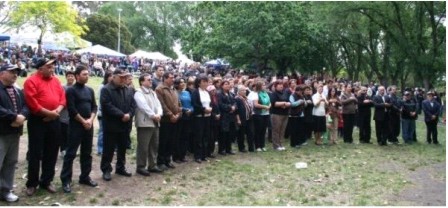 THE ALEVI COMMUNITY IN AUSTRALIA
THE ALEVI COMMUNITY IN AUSTRALIA
The majority of Alevi people in Australia are from Turkey. It is estimated that nearly half of the Turkish speaking population in Australia are Alevi. Alevis have different beliefs and practices compared to other religions.
The Alevis from Turkey first migrated to Australia in the late 1960's and early 1970's. They migrated to Australia to seek a better economic and social future for themselves and their families. Alevis endeavor to provide better educational opportunities for their children and a comfortable future for their families.
The majority of Alevi people originally settled in Melbourne and Sydney. However, over the years smaller groups have migrated to other parts of the country.
HISTORY OF MEMBER ORGANISATIONS
During the 1990's, the Alevi communities of Melbourne, Sydney and Mildura formed numerous Alevi Cultural Centers in VIC and NSW. In recent years, another two Alevi Cultural Centers were established in Canberra and Sydney. Their intention was to unite, to practice their beliefs and meet their community's social, cultural and educational needs.
Currently, our member organizations include:
- Alevi Community Council of Australia (Melbourne)
- Canberra Alevi Cultural Centre
- Springvale Alevi Cultural Centre
- Sunraysia Alevi Cultural Centre (Mildura)
- Sydney Alevi Bektasi Cultural Centre
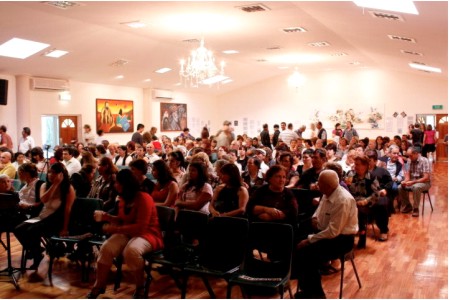 Alevi Community Council of Australia (ACCA) - Melbourne:
Alevi Community Council of Australia (ACCA) - Melbourne:
In Melbourne, the Alevi Community Council of Australia was established in 1992. This was originally known as the Victoria Alevi Cultural Centre. The Alevi community centre was built and opened in 1995. This centre included the Cem Evi. The Cem Evi is a gathering and worshiping place for the Alevi people.
The Alevi Community Council of Australia is a non-profit voluntary organization.
The Alevi Community Council of Australia's aim is to support their community, by developing and delivering programs to meet their needs. The main objectives are to:
- Facilitate the Alevi Community to fully participate in Australian Society;
- To protect and promote the cultural heritage and Alevi philosophy,
- To maintain Alevi values within the community;
- To work towards elimination of discrimination against religion, language, ethnic background and gender.
To achieve these objectives the Alevi Community Council of Australia organizes regular conferences, seminars, theatre performances, educational programs and holds commemoration events. In addition, the Alevi Community Council contributes to broader research and community projects, as well as to magazines and newspapers.
The Alevi Community Council of Australia has established and developed relationships with other Alevi Organizations, and with other associations which are democratic, secular and recognize the Alevi faith and values.
The Alevi Community Council of Australia organizes and delivers a range of services and activities, including:
- Turkish language school for children
- Funeral services in line with Alevi belief
- Saz lessons, Semah and folk dancing
- A range of activities and camps for youth, women and the elderly
- Annual 'Asure' gatherings
- Regular gatherings for worshiping which is called the Cem
- An annual Anatolian Alevi Festival called Abdal Musa Festival, and
- A range of community education programs in collaboration with other services, such as parenting education, legal education, leadership courses, health workshops, and self development courses.
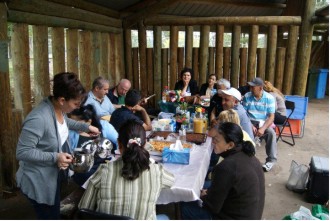 The Alevi Community Centre in Coburg has various facilities. The facilities include 4 classrooms for language classes, computer facilities, a morgue, a cafeteria, the Alevi Community Centre main hall which seats up to 400 people, two meeting rooms, an industrial kitchen, a library, a playground for children, and a 60 car space car park,. The Alevi Federation of Australia's office is also located at this facility.
The Alevi Community Centre in Coburg has various facilities. The facilities include 4 classrooms for language classes, computer facilities, a morgue, a cafeteria, the Alevi Community Centre main hall which seats up to 400 people, two meeting rooms, an industrial kitchen, a library, a playground for children, and a 60 car space car park,. The Alevi Federation of Australia's office is also located at this facility.
Canberra Alevi Cultural Centre
Canberra has a very small population of Alevis compared to that of Sydney and Melbourne. Hence, it was only in 2006 that the Canberra Alevi Cultural Centre was established. After some initial discussions amongst Alevi community members residing in Canberra, a general meeting was held in November 2006 and a Committee of Management formed.
Since its establishment the key objectives of the Canberra Alevi Cultural Centre have been:
- To protect and promote the Alevi culture and philosophy, and to maintain Alevi values within the community;
- To organize cultural and educational activities, like Cems, Semah, folk dancing, theatre performance and seminars;
- To work closely with other Alevi organizations to stand against the oppression and assimilation of the Alevi identity;
- To actively participate in Canberra's multicultural events.
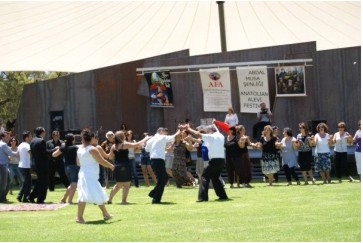 Sunraysia Alevi Cultural Centre (Mildura)
Sunraysia Alevi Cultural Centre (Mildura)
The Sunraysia Alevi Cultural Centre was established on the 11th of July 1992 to preserve and modernize its cultural identity whilst integrating with mainstream Australia.
The aims and purpose of its establishment was:
- to protect and promote the Alevi cultural heritage and philosophy;
- to address the social, cultural, and welfare needs of its community and to encourage participation, inclusion and volunteerism.
The Sunraysia Alevi community identified the need for its own community centre and in 1993 was successful in the purchase of its current building. The Sunraysia Alevi community worked together and in a short period of time was able to fully own its premises. To date this has been one of its biggest achievements.
Since 1992 the Alevi Community has worked with other community organizations, including Health Service providers, Government Departments and welfare agencies to deliver a wide range of programs. Some of these include providing information, advice and direction to its members, as well to the wider Turkish Community. A range of activities for youth, women and the elderly, regular cultural gatherings, including Cems, Semah, folk dancing, seminars and festivals, continue to be provided.
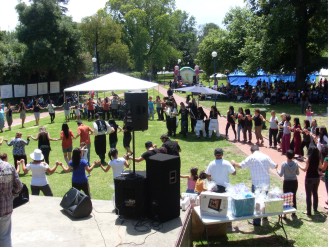 The Sunraysia Alevi Community like other communities is an ageing community living in regional isolation. It recognizes the need to establish a Cem Evi, the provision of funeral services in line with Alevi belief, better infrastructure to cater for its community and to establish a hub where all of the community can gather for cultural functions and to learn about their cultural heritage.
The Sunraysia Alevi Community like other communities is an ageing community living in regional isolation. It recognizes the need to establish a Cem Evi, the provision of funeral services in line with Alevi belief, better infrastructure to cater for its community and to establish a hub where all of the community can gather for cultural functions and to learn about their cultural heritage.
The Sunraysia Contemporary Alevi Cultural Centre is proud of its history and is confident that the Alevi Community will be recognized all over Australia and the world in establishing themselves as leaders in working against discrimination and oppression. It is also proud to be associated with other Alevi organizations in Australia and is one of the founding members of the Alevi Federation of Australia.
Springvale Alevi Cultural Centre
Sydney Alevi Bektasi Cultural Centre
The Sydney Alevi-Bektasi Cultural Centre was established in September 2007 in accordance with the NSW Association Act of 2004. The Sydney Alevi-Bektasi Cultural Centre is a non-profit organisation, run by a voluntary Committee of Management.
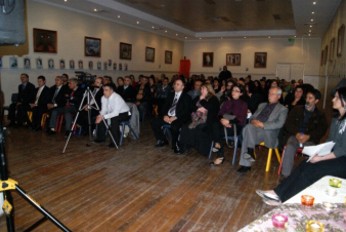 The main focus of the organisation is to serve the spiritual, cultural, social and educational needs of the Alevi-Bektasi community in Sydney, regardless of country of origin.
The main focus of the organisation is to serve the spiritual, cultural, social and educational needs of the Alevi-Bektasi community in Sydney, regardless of country of origin.
The Sydney Alevi-Bektasi Cultural Centre holds cultural and educational activities to nurture awareness, creativity and capability to create a brighter future for the Alevi-Bektasi community.
The organisation utilizes the services of its spiritual leaders (Dede/Ana) who reside in Australia, to cater for the religious and spiritual needs of the Australian Alevi-Bektasi Community.
Sydney Alevi-Bektasi Cultural Centre also aims to contribute to the wider Australian Alevi Society by providing:
- Educational activities on Alevi philosophy
- Youth outlook programs
- Traditional musical courses and dances (Semah)
- Seminars
- Spiritual gatherings
The Sydney Alevi-Bektasi Cultural Centre's work is made possible by the generosity of donors, volunteers and friends - all joined together in the spirit of selfless service.
WHO ARE ALEVIS
Alevis are a sub-ethnic and cultural community from Anatolia (modern day Turkey), numbering in the millions. Alevis descended mainly from Anatolia.
Alevi belief is a way of life that also appears in other parts of the Middle East, Central Asia and the Balkans.
The Alevi path as a belief system is an ancient way of testifying that has been passed on through oral traditions in all of the languages with which Alevis have became acquainted. Oral tradition is directly relevant to the ethnic identity of Alevis. An important source of Alevi beliefs and thought are the mystical poems and musical ballads (deyisler, nefesler) that have been passed down from generation to generation, many of which have not been recorded in writing. Among the greatest Alevi-Bektashi poet-musicians (asiklar, ozanlar) are Yunus Emre (13-14th century), Kaygusuz Abdal (15th century), and Pir Sultan Abdal (16th century).
Humanistic attitude or what is often called Humanism is Alevis lens on and way of perceiving the world. In the Alevi path, divine presence is universal and resides in the heart of all humans.
This belief is based on love and respect for all people, attitudes, knowledge, sharing and science. Alevis believe that one must respect and have knowledge of nature. Alevi principles promote and encourage individuals to behave modestly, to feed, refine and mature. The principles of love, tolerance and humanism are significant to Alevi philosophy.
Alevis believe goodness in humans, and this is expressed by the Alevis saying: 'Insan Hakta Hak Insanda'. The Alevis do not believe in a god in an individualized form or as a universal force. Rather, god is within every human being as well as everything in the universe.
HISTORY
The Alevi belief and way of life have been around for thousands of years, and can be traced all the way back in history to the Sumerians.
The confusion over the Alevis is linked to a troubled past. Historically, Alevis have avoided bringing attention to themselves to avoid confrontation with authorities.
Authorities for centuries have oppressed, discriminated and massacred Alevis, forcing them into denial of their identity and assimilation into the dominant way of life. Alevis looked in hope for the establishment of the Republic of Turkey as liberation from the Ottoman oppression and religious discrimination. However, Alevis were once again not recognized as a distinct group and were oppressed, discriminated and politically assimilated. There were forced deportations by authorities, as well as masses of Alevis fleeing to other parts of Turkey and Europe because of fear for their lives. This resulted in much of the traditional Alevi culture and practices to be forgotten.
In 1925 the Turkish State adopted a policy of one race one religion, forcing Alevis to cloak themselves with Islamic veil to avoid persecution. In Alevi stories you will find some Islamic elements - this has been a deliberate way of hiding from those in power. Unfortunately policies allowing discrimination continues until today. One of the main obstacles for Alevis is the Turkish Governments perceptions of Turkey's identity - as being 99% Muslim.
The Alevi path, due to its unique identity, culture, communal structures and laws resisted against the dominant rulers. In the Alevi belief, there is a built in respect for other people's views and an emphasis on the mystical inner self. There is no support for power struggle in the Alevi philosophy. Alevi belief is dominated by deep humanism, love and tolerance.
The origins of Alevi philosophy is not the Middle East, nor Central Asia. Its birth place is Anatolia and Mesopotamia. For centuries ethnic and religious cultures living side by side have influenced one another. Therefore, in the Alevi practices we can see aspects of Zoroastrian , Shamanism, Judaism, and Christian rituals. Some claim Alevi path as an Islamic sect and denomination, but the only purpose of this has been to assimilate and dispose of the Alevi identity.
ALEVI BELIEFS AND WAY OF LIFE
Alevis do not wear any distinctive dress and cannot be distinguished from other people. Men and women have equal rights and responsibilities in life. In the Alevi philosophy humanity is the centre of universe and there is the unity of existence - people, nature, minerals and the universe are one. Alevis also hold dear the following values:
- individual autonomy (the essence of human rights);
- personal responsibility (humans cannot pass this to 'higher forces');
- no dogmas (no religious do's and don'ts: purity lays in someone's acts and thoughts), and
- Self-realization.
Men and women are given the same opportunities and take part equally in all facets of life. In Alevi discourse, women are sublime (worthy of the highest moral and spiritual value) and you will find this philosophy condemning gender discrimination. As the following quote illustrates, in Alevi philosophy, it is not gender but peoples voluntary love, kindness, respect and contribution that is seen as superior.
My pilgrimage is towards mankind
There is NO supreme religion, supreme race,
supreme language, supreme culture,
supreme gender in our belief.
No flower is better than another,
every flower has it's distinguished colour,
distinguished smell.
All Flowers are beautiful.
All mankind are beautiful!
All mankind are equal...
(Haci Bektas Veli, 1210-1300AD)
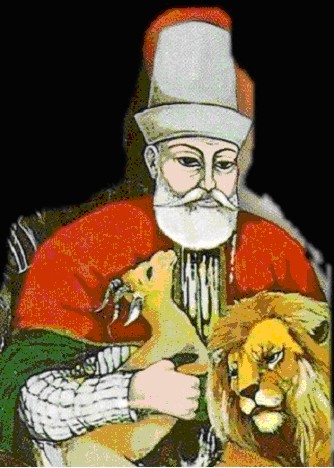 In Alevi cosmology all human beings are considered as "Can" or Life - living in all areas of social space.
In Alevi cosmology all human beings are considered as "Can" or Life - living in all areas of social space.
The core Alevi belief is to purify oneself of their sub identities, such as race, religion, gender, language, status, and authority and return to their true core identity as a human being.
Real freedom is freedom from all forms of bondage. It can be achieved only through development and purification of one's own mind - purging and cleansing oneself from all taints of greed, hatred and delusion.
Another significant Alevi belief that is the absolute centre of Alevi behaviour is that 'control comes within' - the Alevis express this self-control by using the following moral code: "Eline, diline, beline sahip olmak".
- ELINE: control of hand, formids killing, stealing or committing violence against another human.
- DILINE: control of the tongue, formids gossip, lies or speaking maliciously.
- BELINE: control of loins, formids adultery and non-consensual sex.
ALEVI RITUALS
An important part of the Alevi culture is Alevi Rituals. These rituals do not include the practice of prayer five times a day, attending mosque, fasting during Ramadan, undertaking pilgrimage to mecca or reciting from the Koran. Alevi's have their own prayer house called Cemevi and their own cultural and spiritual practices unique to their faith.
All Alevis are connected to or claim descent to a specific "Ocak" (Hearth/Caste) and all Ocak's are connected to a "Dergah" (lodges). The Alevi Institution comprises of the following:
- Pir (Enlightened pure person; spiritual leader of a community)
- Mursid (spiritual teacher)
- Dede, Baba or Ana (an elder)
- Rehber (a guide to the faithful)
- Zakir (poet and musician)
Traditionally Dede/Ana's did not merely lead rituals, but led their communities. They also acted as judges or arbiters, presiding over community courts called "Hakkikat Meydani".
Dede/Ana performs the Cem rituals, leads funerals, teaches new generations, initiates the young, mediates conflicts and aids "Talips" (the disciples).
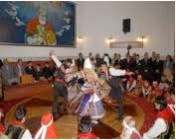 Cem's
Cem's
One of the important Alevi rituals is the Cem. The Cem is a gathering of Alevi believers who come together to worship and establish "erkan" (a community court) to resolve community problems. It is conducted by an elder referred to as "Dede" or "Ana", accompanied by a "zakir" (musician and poet).
There are several important elements in a Cem gathering, some of which include:
- Dede / Ana - an elder that conducts the Cem ritual
- Rehber - guide and communicator between the "Dede/Ana" and the disciples
- Zakir - a musician ,who plays the "saz" and recites spiritual songs and poems
- Erkan - a community court comprising of equal numbers of men and women, who are mature and respected community members
- Cerag - lighting of a flame, which symbolizes the lighting of the path
- Kurbanci - person responsible for the offering
During this gathering, spiritual dancing of semah and music played by the saz is performed. This is followed by the sharing of a meal called lokma which is provided by the community.
The Semah, which is a spiritual dance, is an important part of the Cem and is characterized by turning and swirling. This dance of worship has many varieties. The semah is performed by men and women to the accompaniment of the Saz or the lute. The semah is an inseparable part of any Cem.
Musahiplik
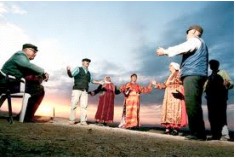 Another important Alevi ritual is Musahiplik. Musahiplik is a spiritual brotherhood between two married couples making a lifelong commitment to care for and share each other's welfare. The ties between couples who have made this commitment are stronger than that of blood relatives.
Another important Alevi ritual is Musahiplik. Musahiplik is a spiritual brotherhood between two married couples making a lifelong commitment to care for and share each other's welfare. The ties between couples who have made this commitment are stronger than that of blood relatives.
Muharrem Orucu (Muharrem Fast) and Asure
In the Alevi belief, another ritual called Muharren Orucu is a major Alevi fast which is generally held in the first 12 days of the month of Muharrem (in the modern day calendar this falls between 28 September and 10 October of each year). In addition to abstaining from food, many Alevis who fast during these 12 days, also abstain from drinking water both day and night. They will intake liquids other than water. During this fast, Alevis will also avoid any sort of comfort or enjoyment. The main purpose of this fast is to mourn the death of Ali's son, Huseyin, during the battle of Kerbela.
Following on from the Alevi fast, a special dish of Asure is cooked. Asure is prepared from a variety of 12 different grains, fruits and nuts. This is shared amongst community members.
Abdal Musa Feast
Another significant event in the Alevi faith is the Abdal Musa Feast. The Abdal Musa Feast is a celebration where the traditions of unity and togetherness are preserved. The Abdal Musa Feast has been celebrated by the Anatolian Alevis since the 14th Century.
Abdal Musa was one of the most significant saints in the Alevi tradition. His philosophy is to love one another, share the wonders of the world, and help those less fortunate than themselves.
The Abdal Musa feast is a celebration of peace, love and togetherness, where a meal of bulgur rice and meat of offering is cooked in communal pots. After a blessing by the Dede or Ana, an Alevi elder and spiritual leader, the meal is shared by all.
Abdul Musa celebrations include music and the mystical dance called Semah, accompanied by the sacred ritual instrument known as the Saz.
Nevroz
Nevroz falls on 21 March and marks the first day of spring and the beginning of the year. It is celebrated my many ethnic groups, including Alevis and represents a day of newness, reconciliation and the start of spring. Alevis celebrate Nevroz with "Cems" and other special programs. In 2010, the UN's General Assembly recognized the International Day of Nevroz, describing it a spring festival of Persian origin which has been celebrated for over 3000 years.
Hizir Orucu (Hizir Fast)
Another Alevi fast is the three-day Hizir fast (Hizir Orucu), generally observed 13-15 February. Many Alevis fast during this time to honor Hizir, a holy figure who they believe saves those who are in distress. Alevi's call on him for help and rescue. Hizir is the patron saint of travelers, protecting them from the dangers and difficulties of the road. Alevis have dedicated a specific day to him in February called "Hizir Day". This is a day of prayer, contemplation, mysticism, healing, wish-fulfillment, music, poetry and festivities. After fasting for three days, Alevis gather and call on Hizir to be with them at all times. This special celebration includes special foods, the performance of sacred Semah, and singing sacred songs.
Hidir Ellez
"Hidir Ellez" or "Hidellez" is the day on which prophets Hizir and Ilyas met with each other on earth. Some hold that Hidir comes to the rescue of those in distress on land, while Ilyas helps those at sea; and that they meet at a rose tree in the evening of every 6 May. The words Hizir and Ilyas have since fused together and is pronounced as Hidellez. Hidellez falls on May 5-6. There are various theories about the origin Hidrellez. Hizir is the symbol of spring, and the new life which emerges with it.
Hidellez, which is still celebrated in Anatolia, has been celebrated since ancient times. Although it is celebrated under different names and in different times, it is possible to see the motifs of Hidellez in many places. The arrival of spring and awakening of nature have been perceived by mankind as a phenomenon to be celebrated. In fact, Hidellez, as a spring festival, has a universal character.
ALEVI SAYINGS
It is impossible to give a simple definition of modern Alevi faith. This should not come as a surprise to many as it is also impossible to simply define other faiths in the modern world. Just as there are different interpretations in other faiths, the same can also be said about Alevi faith. The following are some simple quotes that may provide an insight into Alevis and how they perceive the world:
- "The important thing is not religion, but being a human being."
- "The greatest holy book to be read is a human being."
- "We don't do ritual prayers, we do supplication."
- "If you hurt another person, the ritual prayers you have done are counted worthless."
- "My spiritual focus of attention is the people around me, not a building in Mecca."
- "Seek and you shall find."
- "Don't forget that your enemy is also a human being."
- "Teach/educate women."
- "Don't do to anyone what you don't want done to you."
- "Even if you are offended, do not offend in return."
- "Take responsibility for your words, actions, and morals."
- "Take responsibility for your own spouse, job, and nourishment."
- "Treat all people equally".
- "Whatever you look for, find it within yourself!"
- "NEVER insult a person or his/her race..."
- "The beauty of a person is the beauty that comes from his/her kind words..."
- "The first step to attain ones wisdom is self discipline!"
Sources:
David Zeidan, THE ALEVI OF ANATOLIA, Volume 3, No. 4 - December 1999, Middle East Review of International Affairs (MERIA) Journal
John Shindeldecker, Turkish Alevis Today, http://www.alevibektasi.org/xalevis1.htm
Alevilik'te Hizir, http://www.aleviakademisi.org/component/content/article/47-alevilikte-kutsal-gunler/162-alevilikte-hzr.html
Alevi History, http://en.wikipedia.org/wiki/Alevi
Nevroz, http://en.wikipedia.org/wiki/Nevroz
What is "Hidellez"?,http://www.hidrellez.org/english.asp

